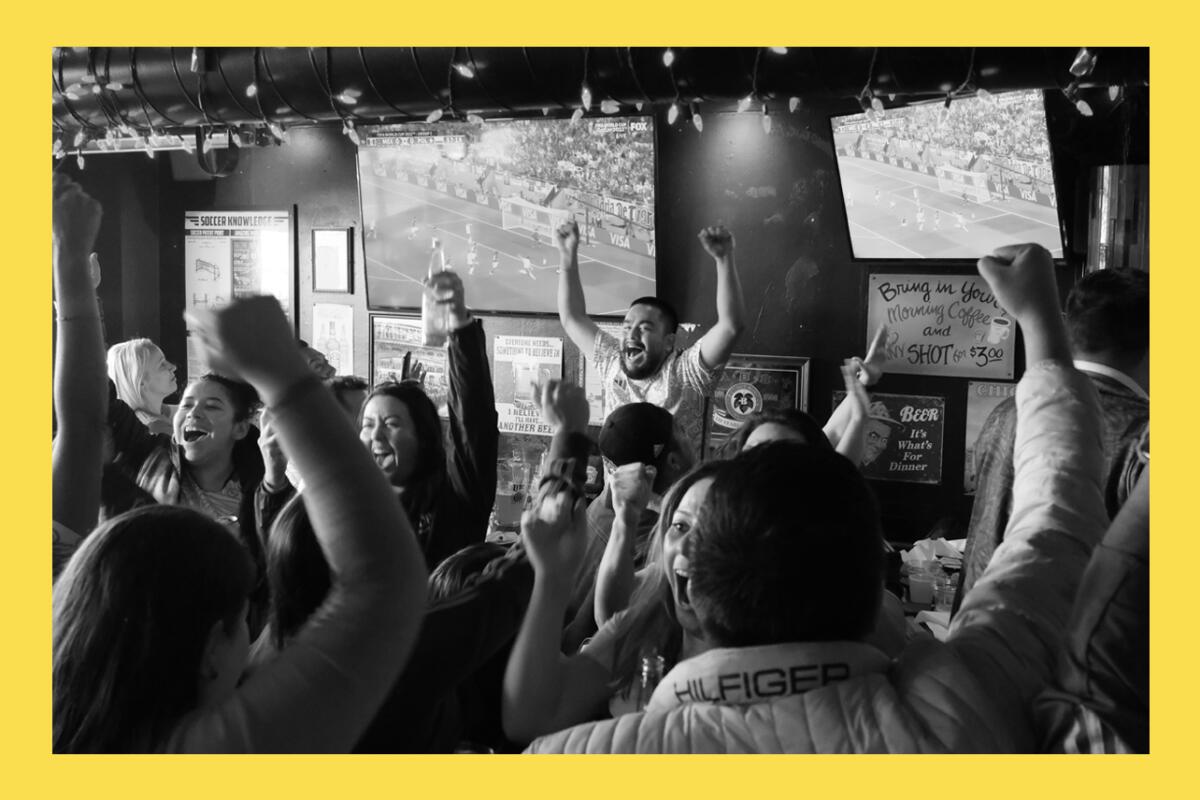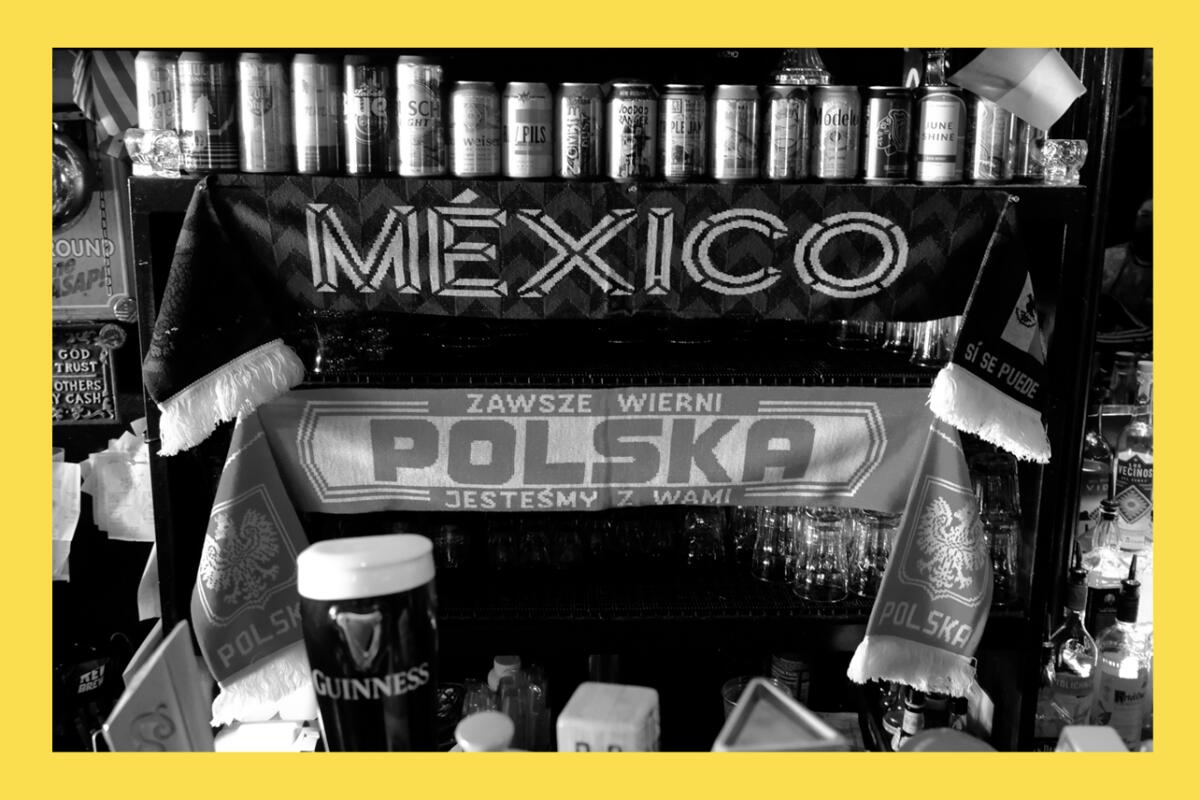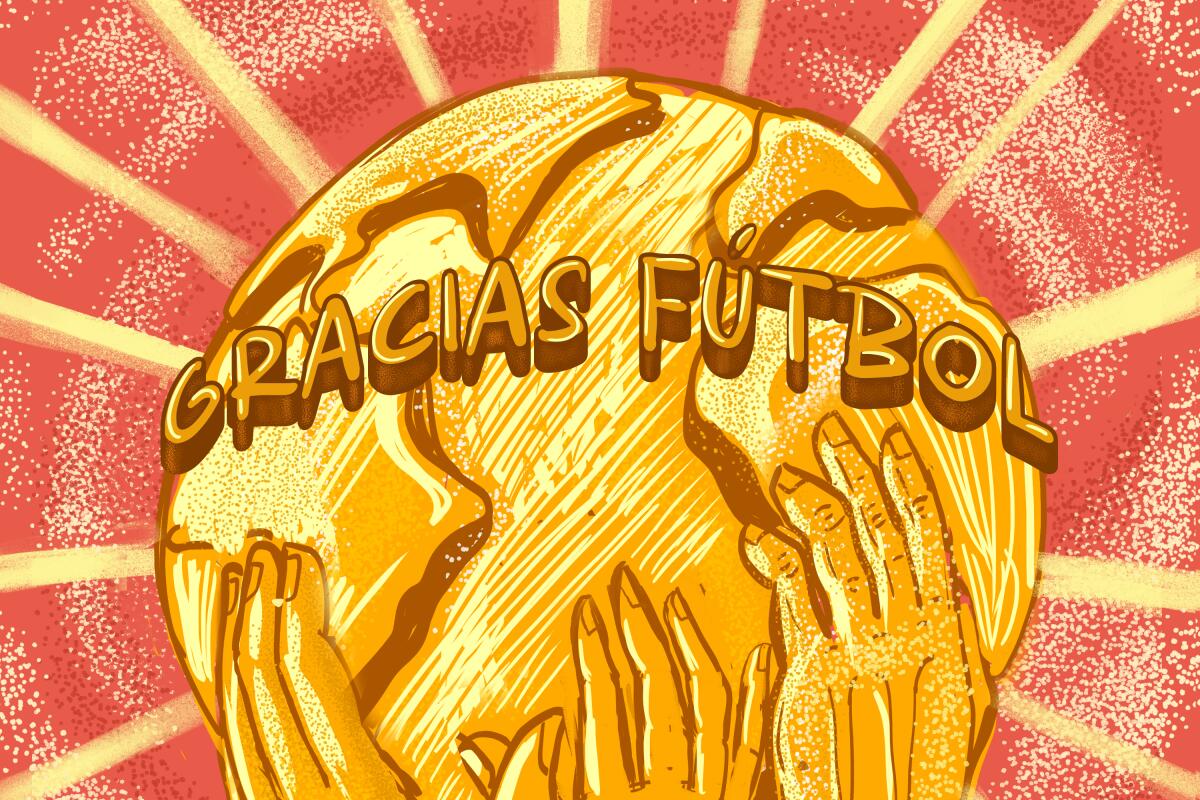Latinx Files: Watching the Mexico-Poland World Cup game from a Chicago bar

- Share via
Hi, folks, it’s Fidel. Once in a while, I’ll ask a guest writer to take over the newsletter so I can take time off. Today is one of those instances. I’ve asked Lee Bosch to fill in. He is a former chef turned freelance writer and producer. He was raised in San Diego to Mexican parents and is now based in Chicago.
A quick note. Today’s newsletter was inspired by this tweet from Carlos Ballesteros, an investigative reporter for Injustice Watch.
On Tuesday morning, a wave of red, white, green and cream rolled into Cleos, a nonaffiliated soccer bar in Chicago’s Ukrainian Village that opened early to show the World Cup match between Mexico and Poland. The place was at capacity 15 minutes before the game started, and a line formed outside.
Chicago is home to one of the largest Polish and Mexican communities outside of their respective countries, and those who showed up at Cleos did so in hopes of finding a neutral ground. If ever there was a city in America that would have such a place, Chicago would be it. These two groups have intersected for years. Several neighborhoods that were once Polish are now heavily Mexican. On Twitter, people unofficially dubbed this match “the Battle of Archer Ave,” a nod to the artery that connects both groups.
Even my commute to Cleos down Chicago Avenue felt neutral. As I rode my bike, I passed by cooks making their way into a closed Yoli’s Tacos. I passed Dark Matter Coffee, whose windows were adorned with the flags of Mexico and Poland. There was also Kasia’s Delicatessen, opened in 1982 by Polish immigrant Kazimiera Bober.
“It makes it more fun,” said José Cervantes, a 33-year-old Mexico supporter who came to Cleos from nearby Humboldt Park. “Anywhere you go, you expect it to be more Mexico fans, but there’s a great mixture here.”
“Polska! Polska! Polska!” yelled a pair of Poland supporters sitting by the entrance, as a trio of fans adorned in red-and-white scarves and jerseys walked in.
The Latinx experience chronicled
Get the Latinx Files newsletter for stories that capture the multitudes within our communities.
You may occasionally receive promotional content from the Los Angeles Times.
At a nearby table sat Nadia Morales. The 33-year-old was wearing a Poland hat and a Mexico shirt. Her mom is Polish and her dad is Mexican. Both came to Chicago in their 20s. Sitting with her were her brother, cousin and uncle. Morales said she didn’t care which side won.
“It’s fun growing up in two different cultures,” she said. “I have a lot of culture and language through both [parents]. It’s been cool growing up being both, especially in a city that’s so well represented in both cultures.”
Not everyone was so indifferent. The excitement inside Cleos quickly gave way to tension after an uneventful first 45 minutes that saw no goals.
“I’m just glad we got into the half not down,” said Sylvester Kaminski. The 31-year-old Poland supporter made the 30-minute drive from the suburbs with four friends.

And then it happened. In the 54th minute, Robert Lewandowski was taken down in Mexico’s penalty area. Play continued, but eventually the referee opted for a VAR (video assistant referee) check. Every replay shown confirmed the inevitable. It was a penalty, and with every replay came a round of groans and claps.
Eager to share criticisms of the play, this was the first time fans felt around their surroundings. It was like the end of “Our Father” at Mass, with folks looking toward their neighbors. Only instead of offering a “peace be with you,” it was an opportunity to communally gripe about the game.
As Lewandowski stepped to the spot, a wave of arms went up around the bar. Held out, fingers wiggling, followed by an elongated “eeeeeeeyyyyyyy.” It sounded like the beginning of that chant. But it felt different. The energy wasn’t directed at Lewandowski. It was aimed at Mexican goalkeeper Guillermo Ochoa. He was their Goku, and they were trying to channel a Spirit Bomb.
It worked. Ochoa guessed correctly and deflected the shot.
For the next five minutes, every completed pass, dispossession and shot attempt were met with roaring cheers and jeers. The bar had come to life and so had the interactions among opposing fans, with facial expressions exchanged after close moments or nice plays.
But when the high from the penalty miss wore off, and the game slowed back to a lull, a sense of annoyance and disgruntled stares passed through the bar. Earlier in the day, Saudi Arabia had stunned World Cup favorite Argentina, and a great opportunity was slipping away from Poland and Mexico.
The final whistle came. Judging by curses and half-hearted table slaps, you would have guessed both teams had been eliminated. The place cleared quickly. No one really wanted to linger in the stink of the game.
Those who stayed did so because of the nice weather. They had already taken the day off from work, and besides, neither team actually lost.
“I feel like everyone was just sweating,” Lexi Martinez said through a laugh. She was wearing a Mexico shirt and was there with her friend Rachel Trybula, a Poland supporter.
“The energy was great,” Trybula said. “What I was happy to see the most was for the most part everyone was super respectful of each other. There was a mutual camaraderie, which I feel like a lot of Mexican and Polish families have had since Chicago has been around.”
Consider subscribing to the Los Angeles Times
Your support helps us deliver the news that matters most. Become a subscriber.
“It was nice having people come up and say, ‘Good game,’” Martinez added.
“Despite the violence we get noted for a lot, if you go into the thick of it, into the veins and blood of Chicago, everyone takes care of each other,” Trybula said. “There’s a lot of passion and a lot of mutual respect for each other. We love and we love hard.”
Gracias Fútbol

Hey, folks, it’s Fidel again.
In case you can’t tell, we take the World Cup very seriously in this household. So much so that we’ve put together “Gracias Fútbol,” a collection of essays and comics about our favorite memories of the planet’s biggest sporting event.
My contribution is a story about the 2006 edition of the tournament, and why it epitomizes the joy of suffering that’s so inherent to the beautiful game. “Gracias Fútbol” also features an essay from Angel Rodriguez, editor of the Latinx Files and general manager of the Times’ Latino Initiative. He wrote about the Landon Donovan goal against Algeria in the 2010 World Cup, and what it means to las viejitas en su vida.
We also have pieces from our Los Angeles Times en Español colleagues. Jad El Reda recalls a chance encounter with Andrés Escobar, the Colombian player killed after he scored an own goal in the 1994 World Cup. Eduard Cauich wrote about learning about the tournament for the first time in 1990.
“Gracias Fútbol” also features comics from artists Pepita Sandwich and Joshua Sandoval.
Finally, and most importantly, this project also includes a collection of memories solicited from readers of this newsletter, Times colleagues and Andrés Cantor. Yes, that Andrés Cantor.
This project was created by the Latino Initiatives team. Editing by Angel Rodriguez, Fidel Martínez, Iliana Límon Romero and Ed Guzman. Art direction by Martina Ibáñez-Baldor. Illustrations by Joshua Sandoval. Print package by Allison Hong and Elsie Ramos. Audience engagement editing by Marisa Martinez.
The Latinx experience chronicled
Get the Latinx Files newsletter for stories that capture the multitudes within our communities.
You may occasionally receive promotional content from the Los Angeles Times.





